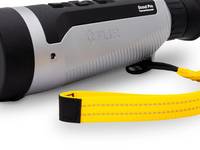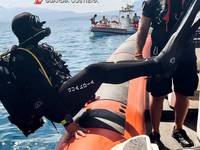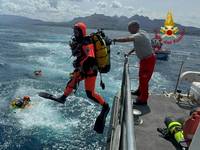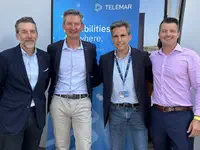Five Minutes With Trond K. Johannessen
Trond K. Johannessen President & CEO, Hatteland Display
Trond K. Johannessen, President & CEO, Hatteland Display, shares with MR his insights on the evolution and future direction of this Marine Electronics subsector, modern marine displays.
Please tell us how you came to lead Hatteland Display.
As so often in life, it was a coincidence that I got introduced to Hatteland Display in 2008 by a former colleague from McKinsey &Company that had contacts in the Board of Hatteland Display. One thing lead to another and in early 2009 I started as CEO and my former colleague as CFO.
When you took over the President and CEO post what did you see as the company’s main strengths?
It became clear to me very early that Hatteland Display had a very strong brand and a clear position as the market leader in maritime displays. This coupled with a very skilled organization with strong innovative capabilities constituted a strong platform for further development.
Weaknesses?
Almost immediately after I joined Hatteland Display in February 2009 the financial crisis hit us with full force. We experienced a significant drop in both revenues and order intake. In this situation it became clear that the company had a few operational challenges that needed to be dealt with. We had to streamline our development processes and take a close look at the manufacturing processes to improve efficiencies.
From the outset, what were your short and long term goals with the company, and to date, how has reality stacked up to goals?
The short term goal was to build a platform for growth and the long term goal to realize growth in both sales and profits. The way to make this happen was to further strengthen the number one position in the market by having the most innovative, best value and highest quality products in the market. In short we have delivered on these goals in an excellent way. We have experienced growth in a difficult market and our new SeriesX product platform is clearly shaping the future of marine displays and computers.
Similarly, how have your goals changed?
I would not say that our goals have changed. I believe we need to continue to build on the strong platform we have and continue to stay ahead of competition as technologies evolve. If we manage this we will continue to grow.
I am familiar with Hatteland Display for many years, but perhaps some readers are not. Can you give a brief overview of the company, its product and service offerings today?
Hatteland Display is a leading manufacturer of type approved marine displays and panel computers for the professional market. Our customers are the major system integrators and OEMs of everything from bridge solutions to automation systems. Our products are on board merchant vessels, naval vessels and leisure boats. We supply customized hardware and do not have our own software systems except for necessary firmware and API software. One of our key strengths is to be able to cost effectively customize state-of-the-art hardware in relatively small volumes for customers. Hatteland Display is located on the west coast of Norway with sales offices around the world and a well established manufacturing and logistics network in Asia.
If you could pin it down to one or two topical items, what are the main drivers in the marine electronics display business today?
On the market side one of the key drivers is the implementation of mandatory ECDIS for most vessel categories before 2018. This will lead to a massive installation of navigation technology on ships that have been using paper charts up until today. Some industry experts estimate that more than 80,000 new ECDIS systems will be delivered before 2018. On the technology side our industry continues to adopt consumer technologies for professional maritime use. Displays with multi-touch technology are very popular currently and more and more software applications are released with support for this technology. We also see that panel computers are increasing in popularity. Where one used to have one computer and one display we now very often deliver a all in one panel computer instead.
What has Hatteland Display introduced over the past year that have been geared to meet these needs?
We spent our time during the financial crisis and invested a lot of money in a brand new product platform that we have named SeriesX. Many see our SeriesX platform as a step-change in product development for maritime use. Touch-screen technology, clean design with no physical buttons, optical bonding and integrated display and computer are key features of the SeriesX platform that comes in sizes from 7 to 26-in. The 24-in. SeriesX product in a panel computer version is currently setting the standard in the retrofit ECDIS market and has already been selected as the preferred product by a large number of ECDIS providers.
During your tenure, how has the company changed the most?
Difficult question and perhaps better answered by someone else than me. In just a few words I think we have become more professional, both in the way we work towards customers, but also in our internal operations.
In general, how has business been in the past 12 months, and specifically by region, vessel or market sector, what looks to be “hot” in the coming 12 months.
During the last 12 months business has been quite good. We have realized growth in both sales and profits and successfully launched a whole range of new products. We have also had successful negotiations around new large projects that, together with the new products introduced make us quite optimistic about the future. It is clearly the products applicable for the mandatory ECDIS opportunities together with our smaller automation displays that are the hottest at the moment.
How is Hatteland Display investing today to ensure its future?
Innovation is key to long term survival in our industry and therefore we continue to invest in product development over the coming months. Moreover, we are continuing to invest in our supply chain in Asia to be able to have even more cost effective products in the future.
(As published in the February 2013 edition of Maritime Reporter & Engineering News- www.marinelink.com)






